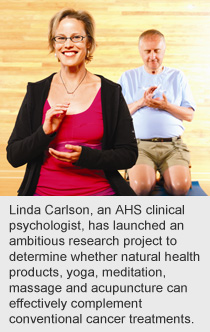
October 15, 2012
Story by James Stevenson
Fighting cancer can be a complex battle, with specific blends of treatments and therapies based on the type and stage of cancer, as well as what medications patients are on and how long they’ve been taking them.
When it comes to supplementing the conventional treatments of surgery, chemotherapy and radiation therapy, there is a host of options, from yoga and acupuncture to massage and natural health products. Some may help; some don’t. Trouble is, few people have a proper understanding of their impacts and when they should be used.
“We’ve identified a real lack of knowledge around natural health products,” says Linda Carlson, an Alberta Health Services (AHS)-Cancer Care clinical psychologist in the department of psychosocial oncology at the Tom Baker Cancer Centre in Calgary.
Carlson has begun an ambitious research project to build an evidence-based database on natural health products.
So far, her group has reviewed more than 800 studies on over 70 natural health products. She is providing staff education, seminars and guest speakers as part of this integrative oncology initiative.
“We’re starting with improving our basic understanding of some of these products, with an aim to moving on to potential clinical trials down the road,” says Carlson, who also holds the Enbridge Research Chair in Psychosocial Oncology within the University of Calgary’s Faculty of Medicine.
The idea is to use non-traditional remedies to complement the treatments currently being prescribed by oncologists. For example, certain natural health products can help lessen painful mouth sores caused by chemotherapy. Acupuncture, in some cases, can help reduce nausea and allow patients to better tolerate the strong anti-cancer medications.
If patients are able to better tolerate their chemotherapy, they have a better chance of finishing their treatments, Carlson says.
Some types of ‘mind and body’ treatments, such as yoga and meditation, are available through the Mindfulness Based Cancer Recovery program at the Tom Baker Cancer Centre.
John Mendham had surgery and radiation therapy more than two years ago for his prostate cancer but also suffers from anxiety. When he gets anxious, he gets a strong abdominal pain. His symptoms have been greatly reduced by yoga and meditation.
“I can actually erase the pain,” says Mendham. “It has helped me tremendously and I practise it daily.”
As part of Carlson’s ongoing education for patients and caregivers, globally renowned nutrition scientist Wendy Demark-Wahnefried is coming to Calgary on Oct. 16 to provide a free public lecture titled: Fighting cancer with your knife and fork – eating for cancer prevention and control.
The talk will focus on the issues of diet and cancer, covering what is currently known and unknown about the relationship between cancer and various nutrition-related factors.
The lecture runs from 7 p.m. to 8:30 p.m, in the Libin Lecture Theatre in the University of Calgary Faculty of Medicine building, 3330 Hospital Dr. N.W.
“Previous studies suggest that diet plays a major role in preventing cancer, as well as potentially influencing the course of disease after diagnosis,” says Carlson. “So this lecture will address current dietary recommendations for cancer prevention and control.”